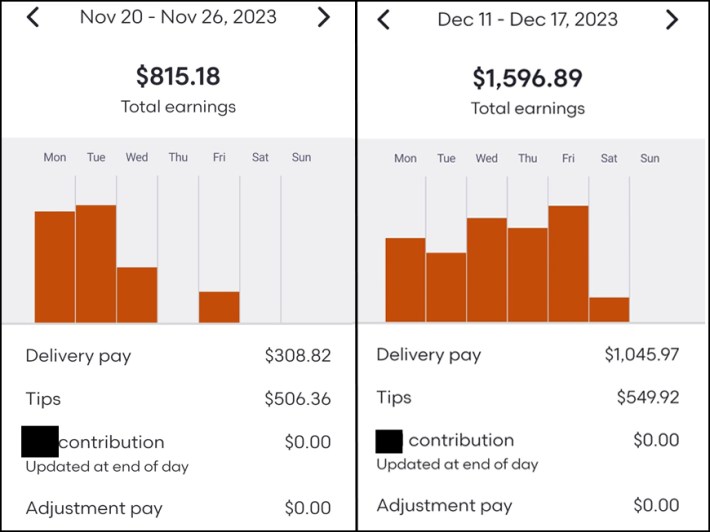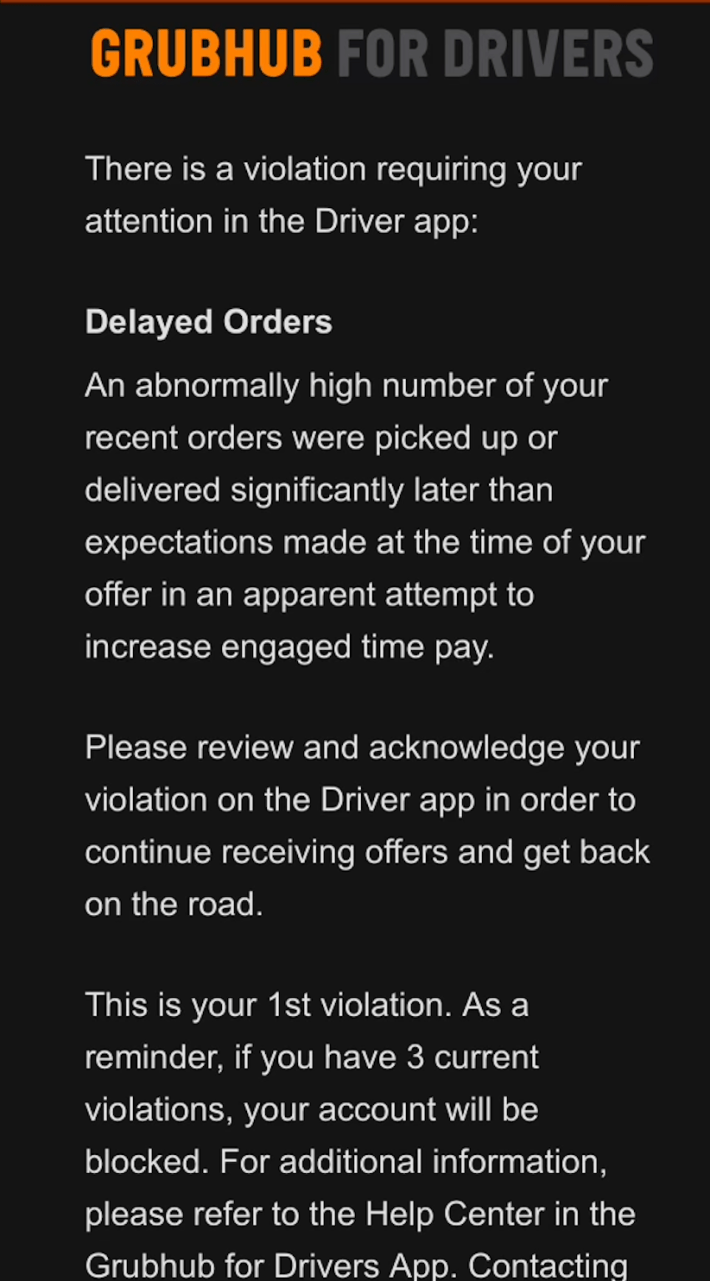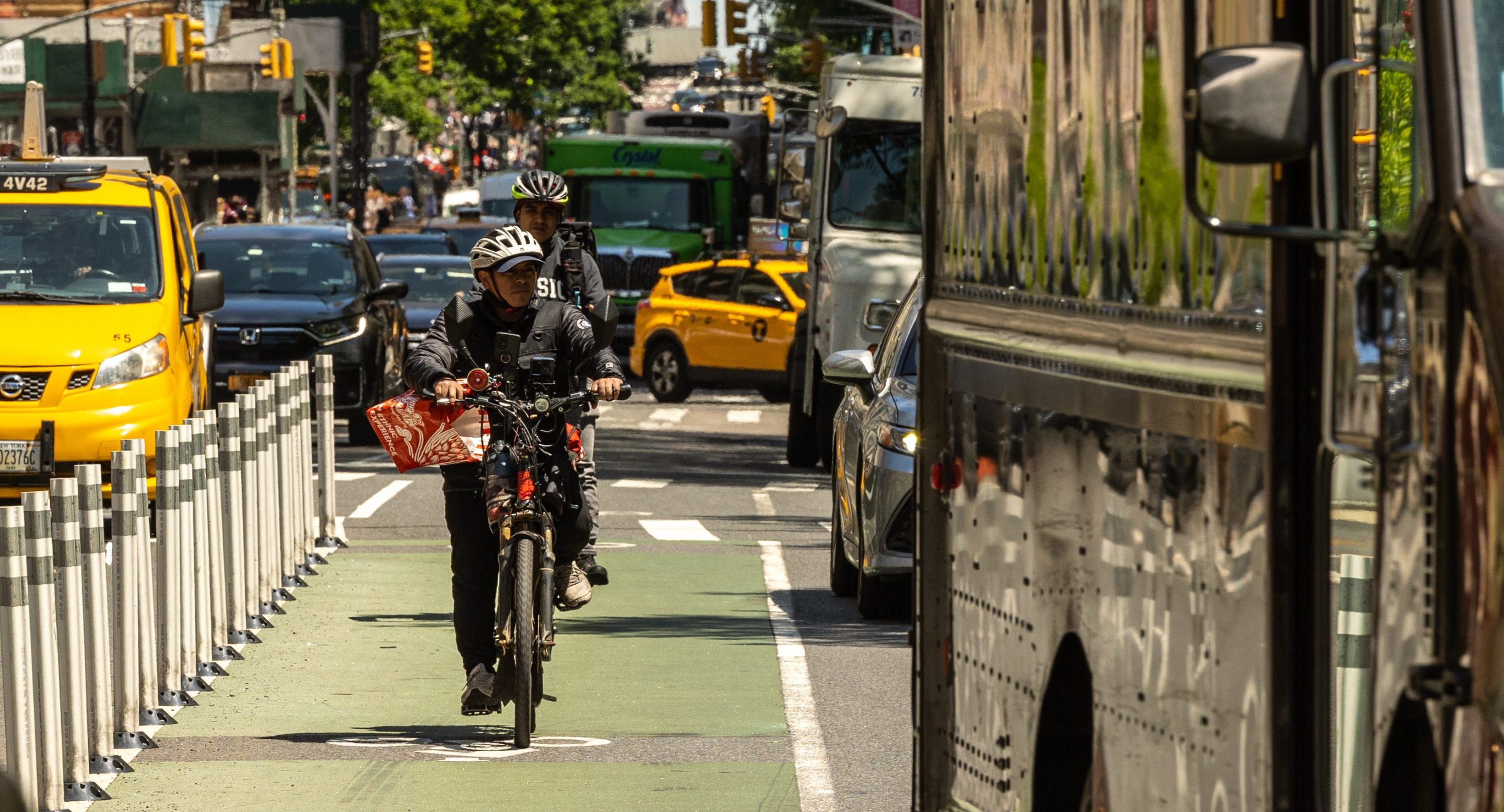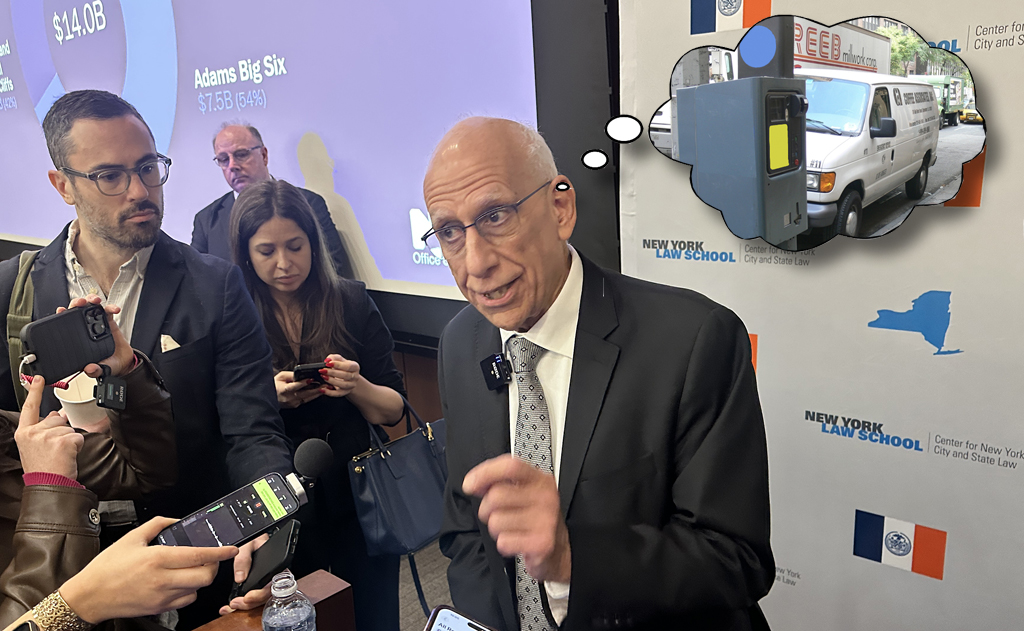Time is money — and safer streets.
The city’s new minimum pay rate for delivery workers, which went into effect late in 2023 after numerous legal challenges, is incentivizing workers to slow down, stop at red lights, and follow the rules of the road — transgressions that have become commonplace within the industry as workers perilously rush to deliver someone’s chicken fingers before they get cold.
“You don't have to risk your life to try to save two minutes anymore. You can take your time and ride safely and have a better chance of making it home at the end of the shift,” said Josh Wood, a member of the Worker's Justice Project who mostly delivers for Uber.
The first-in-the-nation minimum wage for app-based delivery workers, who have long braved dangerous roads, hostile weather conditions, and a raging pandemic to bring food directly to New Yorkers' doors was designed to raise pay in an industry with an average pay of $7 per hour, excluding tips. The new $17.96-per-hour rate promised the city’s nearly 65,000 delivery workers — 26 of whom were killed on the job between 2020 and 2022, according to the Worker's Justice Project — would rise to nearly $20 by 2025.
Uber, DoorDash, GrubHub, and Relay sued, but the law finally took effect at the beginning of December.
Now, the apps have several different options as far as method of payment. The “standard method” pays 30 cents per minute for the entire time someone is connected to the app; the “alternative method” pays 50 cents per minute for the duration of the trip; and a third method allows the app companies to develop their own formulas — as long as their workers make the minimum rate of $17.96, on average before tips.
And the fight has so far paid off, according to Ligia Guallpa, the executive director of the Worker’s Justice Project, who shared screenshots of workers' pay before and after the new rate went into effect.
"We are using the minimum pay to start building a culture of safety and hopefully win New Yorkers' hearts," said Guallpa.

Safety is mostly a matter of perception. The city's own statistics show that electric bikes are involved in very few injury-causing or fatal crashes. But more recently, many delivery workers have shifted to gas-powered mopeds, which are faster and heavier than traditional e-bikes, raising renewed concerns among pedestrians.
That's why it's noteworthy that the new minimum wage is showing signs that it is changing worker behavior.
“I’m not in a rush [and] I'm getting more money,” said Alejandro Grajales, who works for DoorDash and Uber. "Before, we have to do as many deliveries as we can. [Now], we don’t need to be in a rush."
Now that delivery drivers in nyc get paid per minute of trip time, this delivery drivers records themself saying why would I run this light? I can wait. Why would i squeeze between these cars? I can wait. Now following traffic laws and driving safe doesnt cost him money. pic.twitter.com/CWT19Pnx4V
— Just one person (@Newyorkist) December 23, 2023
Advocates are already hailing the improvement on the streets.
"By guaranteeing a minimum pay, delivery workers are able to get paid without having to risk their lives to get orders done on a strict schedule — leading to safer bike lanes for all who use them," said Juan Restrepo, director of Organizing at Transportation Alternatives. "Safe streets are safe workplaces and this year we need City Hall to get the NYC Streets Plan back on track and build more protected bike infrastructure citywide to ensure all delivery workers have a safe workplace. Delivery work is New York City's most dangerous job."
But not everyone is happy with the change. In an apparent form of retaliation for the new pay rate that they had so vociferously been fighting, the app companies swiftly changed the way customers can tip by only providing the option after an order has been made, or after the delivery has been completed – contributing to a big drop in the amount of tips workers are taking home, the website The City has reported. The Department of Consumer and Worker Protection is looking into the new tipping process.
And according to Gustavo Ajche, the founder of Los Deliveristas Unidos, the apps still have a way to pressure workers to go faster: If the worker doesn’t complete a delivery within a predetermined time, which varies based on the order itself, he or she can get kicked off the app.
“In recent days we have seen that the apps are still looking for ways to pressure workers to make deliveries as quickly as possible,” said Ajche.
After three such violations, a worker's account is locked, according to an email sent by GrubHub to its couriers.

A spokesperson for the food delivery platform declined to share specifics, but said in a statement that "delivery windows" are calculated using a variety of factors.
"Ensuring the safety of our delivery partners is a top priority," the spokesperson said. "Delivery windows are calculated using a number of factors, including distance, traffic patterns, and food preparation time, and allow adequate time for a delivery partner to get from the merchant to the customer safely."
That’s exactly what Steven (Neo) Hayes says happened to him after years of delivering for GrubHub. Hayes said he can see the time by when he's expected to compete an order, but that it's often not long enough to account for unplanned issues.
“[They’re] accusing me of fraud after all this time. I can’t make a restaurant complete the order faster,” he said.
A spokesperson for Uber said the new pay rate will only continue to make things worse, while also noting that it’s “premature” to say the change has had any positive effect on the industry as “major operational changes” have yet to be implemented. One of those changes is called Planner, which forces workers to reserve a time to be online, rather than the free-for-all that largely exists now, and gives priority to “couriers who have completed the highest number of trips in the previous 28 days and maintain a high acceptance rate.” Planner is slated to launch after the new year, according to Uber.
“This law will put thousands of New Yorkers out of work and force the remaining couriers to compete against each other to deliver orders faster,” Uber spokesperson Josh Gold has said previously.
The Department of Consumer and Worker Protection said it is investigating all allegations of retaliation and is encouraging workers to file a complaint or call 311.






